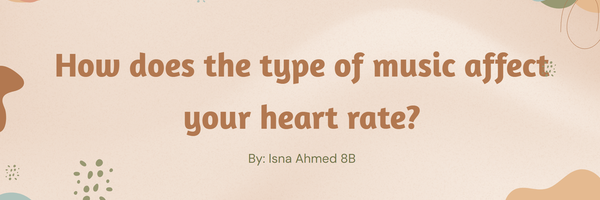How does the type of music affect your heart rate?
Grade 8
Presentation
Hypothesis
For my topic, my hypothesis is that if the type of music affects your heart rate, then the heart rate will increase/decrease depending on the type of music you are listening to.
Research
Research about the heart rate:
The heart is a vital organ that pumps blood throughout the body. It is located in the chest, slightly left of center, and is about the size of a fist. The heart has four chambers: two left and right atriums, and two left and right ventricles. Heart rate refers to the number of heartbeats per minute (bpm). A normal resting heart rate is 60-100 bpm, especially for a 12-14 year old. A person's pulse can be felt at the wrist or neck to measure heart rate. Unusually high or low heart rates may indicate health problems.
Variables
- IV: The type of music
- DV: The heart rate after listening to music
- Constants: Laptop & Watch
Procedure
1. First, record the person's initial heart rate before conducting the experiment.
2. Second, put the type of music on for 45-60 seconds. Once that is done, look at the heart rate and record it in your notebook.
3. Before you start with the other music type, be sure that the heart rate is back to normal before you put the other music on.
4. Repeat in the same order for all music types.
Observations
After my experiments, I had observed that the slowcore music is the type of music that lowers the heart rate, while the rock and pop music increase your heart rate.
Analysis
The study examined the effects of different types of music on heart rate. Initially, participants had a resting heart rate of 66 BPM. Slowcore music led to a gradual decrease in heart rate across trials, with an average of 63 BPM, indicating a calming effect. In contrast, Pop music caused a moderate increase, with an average heart rate of 70.5 BPM, suggesting it has an energizing influence. Rock music resulted in the highest increase, averaging 72 BPM, highlighting its stimulating nature. These findings suggest that Slowcore may be beneficial for relaxation and stress reduction, while Pop and Rock music could be more suitable for activities requiring higher energy levels and alertness.
Conclusion
In conclusion, after conducting the experiments, I saw that my hypothesis was supported, as the heart rate of a person does indeed increase or decrease depending on what type of music they are listening to. According to the table/chart, when we listen to slow music, our heart rate slows down, while when we listen to fast or loud music, then our heart rate increases. In addition, I believe that my problem/hypothesis relates to real life situations too, as most people listen to different types of music, so we should know and learn what it does to our heart. To sum up, this is all I have learned, and I hope you enjoyed!
Application
In addition, I believe that my problem/hypothesis applies to real life situations too, as most people listen to different types of music, so we should know and learn what it does to our heart. To sum up, this is all I have learned, and I hope you enjoyed!
Sources Of Error
I believe that in this experiment, I may have miscalculated the BPM of the people on whom I was testing, as I had used a watch.
Citations
Acknowledgement
I would like to thank everyone who helped with this research. A big thank you to the participants for the experiments for their time and effort. I am also grateful to my teachers and peers for their guidance and support. Their advice helped me understand the effects of music on heart rate better. Lastly, I appreciate my families and friends for encouraging me throughout this project.

